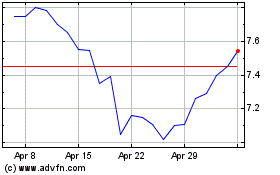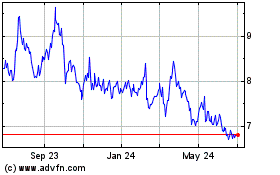UPDATE: Renault Affair May Spur Crackdown On Industrial Espionage
January 09 2011 - 5:46PM
Dow Jones News
Renault SA this week is expected to start the dismissal process
for at least one of the three managers it suspended for allegedly
divulging secrets about the auto maker's electric-car program,
while the French government is using the case to press new
legislation to protect business secrets.
In comments to a French newspaper, Renault Chief Operating
Officer Patrick Pelata said the information allegedly disclosed
concerned "vehicle architecture, and. . .the costs and economic
model of our vehicle program."
"We have arrived at the conclusion that we are facing an
organized system to gather economic, technological and strategic
information to serve overseas interests," Mr. Pelata told the
newspaper Le Monde, in comments confirmed by a Renault spokeswoman.
Mr. Pelata said, however, that no critical information on its
program had been leaked.
Still, the case has generated anxiety in France over the
vulnerability of French businesses, which have less legal
protection against intellectual-property theft than their U.S.
counterparts.
Industry Minister Eric Besson said the government is preparing
legislation that would punish theft of industrial secrets with
penalties similar to those in cases of breaches of defense secrets.
The law would make it a crime offense "to obtain, keep, reproduce
or transfer to unauthorized third parties secret information of an
economic nature," he said in a radio interview Saturday.
According to a person familiar with the matter, Chinese
interests may be behind the case. Mr. Besson, asked about a
possible Chinese connection, said he wasn't in a position to
confirm it.
When Renault suspended the three senior managers last week, it
said only that they had been involved in a serious breach of
confidentiality that put important company assets at risk. The car
maker hasn't yet revealed the managers' names, in accordance with
French law. But one of the three, Matthieu Tenenbaum, a senior
manager in the company's electric program, has insisted he was
stunned by the espionage accusation. He was expecting to be
summoned by Renault on Tuesday for a hearing that could lead to his
dismissal, said a person familiar with the situation.
Workers at Renault's Technocentre, where the three suspended
managers worked, were shocked and know little about what
information may have been passed outside the company, said Alain
Gueguen, head of the Renault branch of the SUD trade union. He and
others were staying up to date on the case via the French media.
"It was like a bomb," said Mr. Gueguen. "That directors could do
something like this is a first. It's exceptional."
In his newspaper interview, Mr. Pelata said the alleged leak was
likely motivated by the ambitious electric-vehicle program at
Renault and its Japanese partner Nissan Motor Co., which want to
dominate the new market for electric vehicles. "It's obvious that
our technology can arouse keen interest, and that this is
especially true as we are a pioneer in electric vehicles," he
said.
The Renault executive indicated that any technology leak was
relatively minor. "We have done a review with our technical teams,"
he said. "It is clear that no nugget of technology that is
strategic for innovation could have leaked outside the company--
including the more than 200 patents registered or in the process of
being registered. "Nothing critical seems to have leaked concerning
the chemistry of the electrodes, the architecture of the batteries,
the assembly of the different components, the charger, or of the
motor itself," Mr. Pelata said.
Instead, he said, any leaked information was about the
surrounding technology used to incorporate a battery and electric
motor into a car. "We think that information was leaked on vehicle
architecture, and on the costs and economic model of our vehicle
program," he said.
"It's serious, but less so than if the damage had concerned
technology," he said, adding that the affair wouldn't change
anything in Renault's electric vehicle program.
The core of an electric vehicle is the battery and associated
electronics. Electric vehicles require sophisticated power
management systems to prevent battery overheating and to extract
the maximum amount of energy for the least possible weight. Car
makers are striving for a technological breakthrough to extend the
driving range on a single charge beyond the current limit of about
150 kilometers.
Renault and Nissan, which share the same CEO, Carlos Ghosn, have
invested a combined EUR4 billion ($5.17 billion) into electric
vehicles. Mr. Ghosn has forecast that electric vehicles will
represent 10% of global automobile sales in 10 years.
--David Gauthier-Villars contributed to this article.
Nissan Motor (PK) (USOTC:NSANY)
Historical Stock Chart
From Jun 2024 to Jul 2024

Nissan Motor (PK) (USOTC:NSANY)
Historical Stock Chart
From Jul 2023 to Jul 2024
